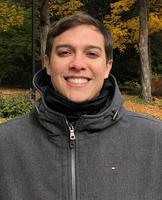Daniel Aloise
Member, GERAD

Full Professor, Department of Computer Engineering, Polytechnique Montréal
Other titles and affiliations
Biography
am very happy to be part of GERAD where I had the pleasure of studying during my PhD. At that time, I was impressed by the quality and also the quantity of collaborative research done there. I am currently an assistant professor in Computer and Software Engineering at Polytechnique Montréal. Prior to joining Polytechnique, I was professor for seven years at the Universidade Federal do Rio Grande do Norte, in Brazil. My move to Canada was very much incited by the creation of IVADO as a research hub in data science, operations research and artificial intelligence.
I am passionate about data mining, optimization, mathematical programming and how these disciplines interact to tackle problems in the big data era. The popularity of internet and cloud services provide nowadays access to very large datasets.
My research interests include new methodologies and applications for two fundamental data mining tasks: clustering and classification. As a popular approach to summarizing large amounts of data, clustering methods help identify unobserved groups for a set of entities, and can be applied in many different ways, in fields as varied as the natural sciences, engineering, psychology, medicine, marketing, economics, etc. The complexity of a clustering problem depends on the criterion used to group objects. For example, the maximization of the smallest distance (assuming a metric space for the entities) between two objects belonging to two different clusters is solved by an algorithm that executes in a polynomial number of steps in the number of objects, whereas the minimization of the maximum distance between a pair of objects in the same cluster is a difficult combinatorial problem. By knowing the computational complexity of the clustering problem at hand, we are in a better position to develop the most appropriate optimization method. In classification problems, the structure of data is learned from observed groups in order to later estimate the groups of previously unseen data. My approach to classification problems is usually based on deep learning models.
As an operations researcher, my work is not limited to applications in data mining. I have been publishing papers in facility location, scheduling, vehicle routing, etc. More recently, I have worked on mathematical optimization applicable to the analysis of perceptual heterogeneous data, helping psychologists and marketers identify objects that are so central to our mental perceptions that they have a “top of mind” advantage. This data is naturally complex and need to be treated in order to be mathematically and computationally processed.
Member of GERAD since September 2017
Education
Research Axes
Research Applications
Publications
As the need for interpretable machine learning continues to grow, we propose a novel post-clustering method to generate counterfactual explanations for clust...
BibTeX referenceNews
Title: Optimisation d’un centre de transbordement à palettes à un port de conteneur
Congratulations to Daniel Aloise, full professor at Polytechnique Montréal, who was awarded the Best Paper Award 2024 in the journal Omega.
Title: Predictive Power of Large Language Models in Bug Severity Detection: An explorative study
Events
Carlile Lavor – Universidade Estadual de Campinas
Celso C. Ribeiro – Universidade Federal Fluminense
Prizes and awards
Best Paper Award 2024
"Data-driven Prioritization Strategies for Inventory Rebalancing in Bike-sharing Systems" (M.C. Martins Silva, A. Aloise, S.D. Jena)Special CAPTRS prize for the Serious Games
HurricaneLogGala Méritas 2018-2019
Productivity in Research Scholarship
Productivity in Research Scholarship
2nd place, 10th DIMACS Implementation Challenge
Distinguished Dissertation Award
Honorable mention in the contest of best Ph.D. Thesis 2008-2009
Second Prize, Challenge ROADEF
Editorial Boards & Comittees
Associate Editor
- International Transactions in Operational Research, since 2021
- Journal of Global Optimization, since 2019
- Operations Research Forum, 2019-2022
Supervision




